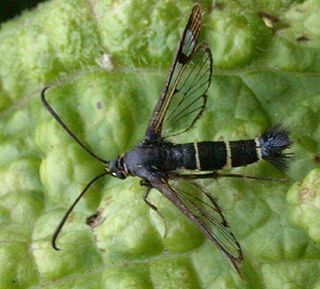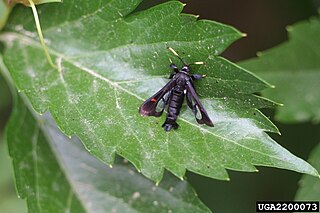
The Sesiidae or clearwing moths are a diurnal moth family in the order Lepidoptera known for their Batesian mimicry in both appearance and behaviour of various Hymenoptera.

The hornet moth or hornet clearwing is a large moth native to Europe and the Middle East and has been introduced to North America. Its protective coloration is an example of Batesian mimicry, as its similarity to a hornet makes it unappealing to predators. The hornet moth has been linked to the large dieback of poplar trees across Europe because its larvae bore into the trunk of the tree before re-emerging as adults.

Synanthedon culiciformis, known as the large red-belted clearwing, is a moth of the family Sesiidae. It is found in the Palearctic and Nearctic realms.

Synanthedon spheciformis, the white-barred clearwing, is a moth of the family Sesiidae. It is found in Europe and Siberia.

Synanthedon tipuliformis, known as the currant clearwing, is a moth of the family Sesiidae. It is endemic to the Palearctic realm, but is an invasive species in the Nearctic realm and the Australasian realm.
Nokona carulifera is a moth of the family Sesiidae. It is only known from Kuranda in Queensland, but probably occurs throughout the western coastal regions of Queensland.
Pseudosesia zoniota is a moth of the family Sesiidae. It is known only from the female holotype which was collected near the Claudie River on the Cape York Peninsula in Queensland, Australia.
Melittia doddi is a moth of the family Sesiidae. It is known only from Queensland, where it was collected near Kuranda.
Melittia chalybescens is a moth of the family Sesiidae. It is known only from Queensland, where it was collected near Kuranda and Mackay.
Synanthedon cupreifascia is a moth of the family Sesiidae. It is known only from locations near Mackay in Queensland.

Bembecia ichneumoniformis, the six-belted clearwing, is a moth of the family Sesiidae.
Anaudia is a genus of moths in the family Sesiidae containing only one species, Anaudia felderi, which is known from Botswana.
Austrosetia is a genus of moths in the family Sesiidae containing only one species, Austrosetia semirufa, which is known from South Africa.
Proaegeria is a genus of moths in the family Sesiidae containing only one species, Proaegeria vouauxi, which is known from Cameroon.

Synanthedon andrenaeformis, the orange-tailed clearwing, is a moth of the family Sesiidae. It is known from most of Europe. It is also present in the Near East.

Albuna fraxini, the Virginia creeper clearwing, is a moth of the family Sesiidae. It is known from the northern United States and southern Canada.

Synanthedon rileyana, the horsenettle borer or Riley's clearwing moth, is a moth of the family Sesiidae. It is found in the United States, including Arkansas, Arizona, Missouri, Oklahoma, North Carolina and Pennsylvania.
Camaegeria aristura is a moth of the family Sesiidae. It is known from Uganda.
Camaegeria sophax is a moth of the family Sesiidae first described by Herbert Druce in 1899. It is known from Malawi, Mozambique, Uganda and Zimbabwe.

Synanthedon scoliaeformis, the Welsh clearwing, is a moth of the family Sesiidae. It is found from almost all of Europe, east through Russia to Japan.








